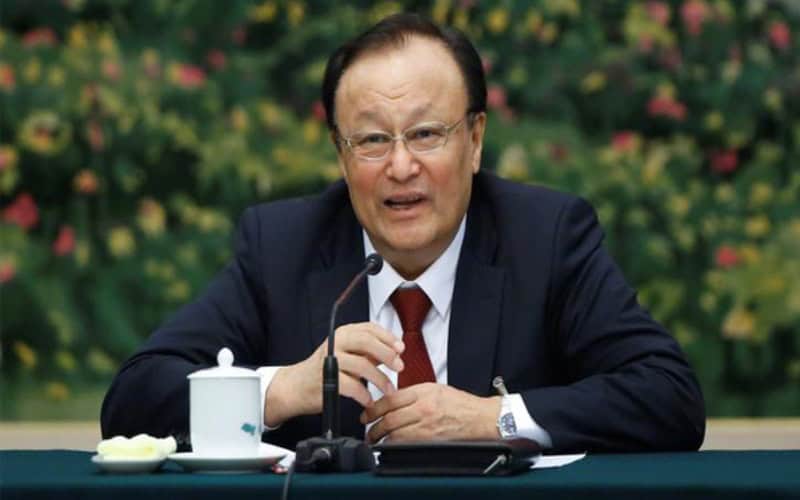Xinjiang: Chairman of the Government of Xinjiang Uygur Autonomous Region, Shohrat Zakir, claimed that the Chinese government’s policies in the region have led to the containment of religious extremism, has brought peace and led to economic growth in Xinjiang.
Speaking to Xinhua, Zakir, while talking about counterterrorism and the vocational education and training programme initiated by the Chinese government in the region, also claimed that the government created policies for the region as a response to the United Nations General Assembly’s resolution on Global Counter-Terrorism Strategy, which entails “addressing conditions conducive to the spread of terrorism, while preventing and combating terrorism”.
While stating that Xinjiang combined the fight against terrorism with the protection of human rights, the governor mentioned “Xinjiang has also stressed addressing the root cause of terrorism, and moved to bring around, educate and save the majority of those who committed petty crimes, through assistance and education, to prevent them from becoming victims of terrorism and extremism.”
Furthermore, Zakir highlighted that only people who have been “instigated, coerced, or lured into terrorist or extremist activities, or people who only committed minor offenses when involved in terrorist and extremist activities” are made to go through the vocational training at “vocational education institutions”.
An agreement is signed with the trainees, following which free programmes are conducted. Certificates of completion are issued after the said trainees meet required standards.
The programmes aim at making the trainees employable, according to the chairman. The programme entails “learning the country’s common language, legal knowledge, vocational skills, along with de-extremisation education.”
Zakir quoted the trainees while explaining that the centres help in giving them a new perspective and a basic pay that makes them realise “that life can be so colourful”. He also described the amenities provided at the institutions at length, while outlining China’s efforts in stabilising Xinjiang.
He further said, “In the past 21 months, no violent terrorist attacks have occurred and the number of criminal cases, including those endangering public security, has dropped significantly.”
Zakir also highlighted the four prefectures in Southern Xinjiang and stated that the region has a long way to go in eradicating terrorism. “The four prefectures in southern Xinjiang were threatened by terrorism and seriously influenced by the spread of religious extremism in the past. Some residents there have a limited command of the country’s common language and a limited sense and knowledge of the law. They often have difficulties in finding employment due to limited vocational skills. This has led to a low material-basis for residents to live and work there, making them vulnerable to the instigation and coercion of terrorism and extremism. There is still a long way to go for southern Xinjiang to eradicate the environment and soil of terrorism and religious extremism.”
Zakir resolutely believes that these policies are a step in the right direction. “We have laid a good foundation for completely solving the deeply-rooted problems that affect the region’s long-term stability,” he exclaimed during the interview with Xinhua.
The governor also explained that programmes will be carried out to invite investments in the Xinjiang region, which will lead to the creation of jobs and alleviate poverty.
Further implementation of policies is on the horizon for the region, according to Zakir, who outlined three major focus areas that will be concentrated on- “construction of the core zone of the Silk Road Economic Belt, the implementation of the rural vitalization strategy and the development of the tourism industry.”
He further outlined that future policies will have the four prefectures in Southern Xinjiang as the main focal point. “It will also take the four prefectures in southern Xinjiang as the main battlefield to fight against poverty with targeted measures to ensure that by 2020, all rural residents living below the poverty line are lifted out of poverty. ”
Chinese policies in Xinjiang have drawn international ire in the recent past. Patrick Poon, Amnesty International’s China researcher told Al Jazeera that Chinese authorities are undertaking a “campaigning of systematic repression”.
Estimates cited by the UN claim that the Muslims in China, a large concentration of whom are found in Xinjiang, are losing their identity and are being forced to renounce Islam.
The vocational institutions referred to by the Governor are also touted as internment camps, where indoctrination of the ethnic Uighurs takes place.
The Atlantic, an American magazine had claimed, “Former inmates-most of whom are Uighurs, a largely Muslim ethnic minority-have told reporters that over the course of an indoctrination process lasting several months, they were forced to renounce Islam, criticize their own Islamic beliefs and those of fellow inmates, and recite Communist Party propaganda songs for hours each day. There are media reports of inmates being forced to eat pork and drink alcohol, which are forbidden to Muslims, as well as reports of torture and death.”
China has long feared that Uighurs will attempt to establish their own national homeland in Xinjiang, which they refer to as East Turkestan.
In 2009, ethnic riots that broke out here resulted in hundreds of deaths, and some radical Uighurs had carried out terrorist attacks in recent years.
Chinese officials have claimed that in order to suppress the threat of Uighur separatism and extremism, the government needs to crack down not only on those Uighurs who show signs of having been radicalized but on a significant swath of the population.
[source_without_link]ANI[/source_without_link]

